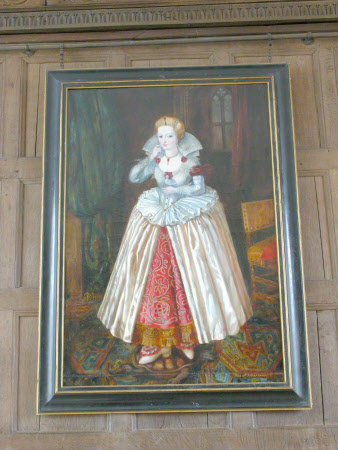A Personification of ‘The Perfect Wife’, miscalled Margaret Roper
Rebecca Dulcibella Orpen (1829/30 - 1923)
Category
Art / Oil paintings
Date
1850 - 1923
Materials
Oil on canvas
Measurements
1060 x 730 mm (41 3/4 x 28 3/4 in)
Order this imageCollection
Baddesley Clinton, Warwickshire
NT 343222
Caption
This is an allegorical portrait of a bride standing in an interior with her foot on a tortoise to illustrate the fact that she will not stray away from home. There are keys at her waist to represent the fact that she will be a good housekeeper and her fingers are held to her lips to illustrate the fact that she will not be a gossip. A dove held in her left hand represents the fact that she will strive to keep the peace, in other words, she will refrain from being quarrelsome. Rebecca Orpen was a talented amateur artist who married Marmion Edward Ferrers (1813-84) of Baddesley Clinton. She was prolific, working in both oil and watercolour, and much of her work remains in the house today.
Summary
Oil painting on canvas, A Personification of ‘The Perfect Wife’, miscalled Margaret Roper, by Rebecca Dulcibella Ferrers Orpen, later Mrs Edward Dering (1830 – 1923) after an anonymous painting, circa 1600. An allegorical portrait of a bride standing in an interior with her foot on a tortoise to illustrate the fact that she will not stray away from home. There are keys at her waist to represent the fact that she will be a good housekeeper and her fingers are held to her lips to illustrate the fact that she will not be a gossip. A dove held in her left hand represents the fact that she will strive to keep the peace, i.e. not be quarrelsome. The original, from which this painting was copied, is believed to hang at Loseley Park in Surrey. The original is currently in the possession of Lord George Sutton (2005). The bride wears a white bodice with a fan collar and a pale pink skirt over a farthingale (hoop skirt) left open to show a tasselled, red brocade petticoat. She stands on a patterned carpet on a tortoise. Behind her to the left is a green curtain and to the right, a yellow chair. A window with gothic tracery can be seen in the background.
Makers and roles
Rebecca Dulcibella Orpen (1829/30 - 1923), artist after British (English) School, artist

